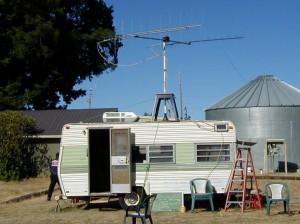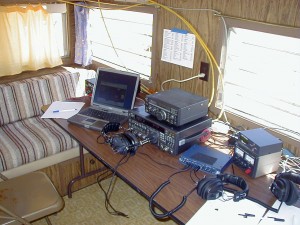It’s that time again, and Field Day is just around the corner. There are plenty of things about to happen, but I want to ask for help in one specific task: I will be running the Satellite Station again this year, and I am looking for a partner (or two, or three, or a team…) to help in Satellite operation.
Satellite work has many special challenges, primarily because of the short time of the satellite fly-bys. It seems that just when you are getting the hang of what you are hearing, the Satellite pass is over—and you add up your points to find you only made five or six contacts. This year I want to punch that up and see if we can make 15 or 16 on each pass. I know it can be done: it is being done by others. How do they do it? They practice, and they work as a team . . .
Making contacts quickly on Field Day is like trying to meet and greet as many people as possible in a dark room, while all of them are busy trying to meet each other at the same time. With a team it’s like having partners wandering around the room taking down names listening to everyone else, while you are busy making an actual contact with just one person. Once the listeners are sure of what they heard, they can pass that information on to you the operator, and speed up the contact rate.
By comparison to other modes, Satellite passes are very busy crowded rooms, and you only have a few minutes. To add to the confusion, we can say it’s more like the the room is onboard a ship, tilting over and moving strongly in the waves. The changes in environment effect everyone in the room at once, though not all the same, and some people lose complete thought of what they were trying to do while others may be less effected. I’m hoping some of you will join me in this, and we get a team of listeners together, and see if we can meet as many as people as possible in the room.
But time is of the essence on every Sat pass, and there is little chance of success if all of our practice takes place at Field Day itself. We need practice beforehand.
Interested? If so, let me know immediately, so we can get in some practice before Field Day. If we can successfully make a team effort, either one of us can be the contact operator, or the listener. We’ll swap headsets and activities if you like, or remain as “listener” and “operator”. Whatever seems to work best.
For practice beforehand, there are many ways to hear satellite passes. Any FM HT can do it, or even a laptop with a $20 USB dongle. Sat’s are flying by all the time, 24/7, and each one is different. There’s plenty of ways to get practice under our belts.
Even internet listening, actually . . . Here is one to try: a Pile-up Trainer. It is not Satellite contacts, and in fact it is easier than Satellite contacts are, but still it’s not a bad place to start.
Keep the volume very low, try to copy it in a noisy environment, play static at the same time, all while being distracted by some other activity, and you’ll begin to get a feel of what Satellite contacts can be like. After a while it’s almost a blessing that the passes don’t last very long. All that listening can be tiring work.
Fortunately most Sat passes last about 12–15 minutes at the most, and then you get a half-hour break or so before wading back in again for another one.
Sound interesting? Are you up for the challenge? If so let me know, and we’ll do what we can to put a team together.
Thank you,
John Sisler (KJ6ZL)


